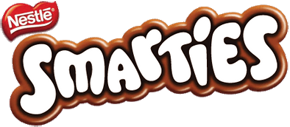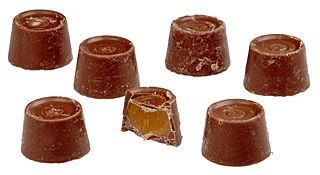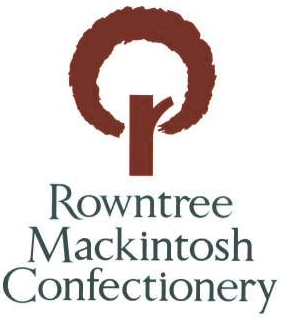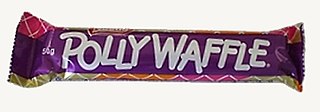
Kit Kat is a chocolate-covered wafer bar confection created by Rowntree's of York, England. It is produced globally by Nestlé, except in the United States, where it is made under licence by the H. B. Reese Candy Company, a division of the Hershey Company.

Smarties are dragée chocolate confectionery. They have been manufactured since 1937, originally by H.I. Rowntree & Company in the United Kingdom, and now by Nestlé.
White Knight is a brand of chocolate-coated, chewy, mint-flavoured confectionery bar sold in Australia. Originally produced by Hoadley's Chocolates it was later manufactured by Nestlé Australia. The packaging is blue and white and features a picture of a knight on a horse. Its slogan is 'Mighty Mint Chew'. The product was discontinued in 2016.
Violet Crumble is an Australian chocolate bar. The bar is a crumbly honeycomb toffee centre coated in a layer of compound chocolate. It was first made by Hoadley's Chocolates in South Melbourne around the year 1913; and is currently made in Adelaide, South Australia by Robern Menz after a period of ownership by Nestlé. Its advertising slogan is "It's the way it shatters that matters", and previously was "Nothing else matters". The bar shares similarities to the Crunchie bar made by British firm Cadbury. Aside from Australia, it is available in Hawaii and a few other places, including Hong Kong, and Mollie Stone's Markets and Cost Plus World Market in the United States.
Wonka was a confectionery brand owned and licensed by the Swiss corporation Nestlé. In 2018, the branding and production rights were sold to the Ferrero Group.

Aero is an aerated chocolate bar manufactured by the Vevey-based company Nestlé. Originally produced by Rowntree's, Aero bars were introduced in 1935 to the North of England as the "new chocolate". By the end of that year, it had proved sufficiently popular with consumers that sales were extended throughout the United Kingdom.

Caramac is the brand name for a caramel-based confectionery created by Mackintosh's, and is manufactured by Nestlé. It was introduced in the United Kingdom in 1959 and was discontinued in 2023 and brought back for a limited period in July 2024. The name is derived from the syllabic abbreviation of Caramel and Mackintosh.

Rolo, referring to the roll-styled chocolates, is a brand of truncated cone-shaped or conical frustum-shaped chocolates with a caramel inside. First manufactured in Norwich, Norfolk in the United Kingdom by Mackintosh's in 1937, they are made by Nestlé

Svitochis a Lviv-based Ukrainian confectionery manufacturer. It is owned by Nestlé since 1998. The company produces chocolate, chocolate candy, lollipops and many other types of candy.
Abel Hoadley was an English-born Australian businessman, confectioner, orchardist and manufacturer of jams and sauces, remembered today as establishing the company's that bear his name A. Hoadley and Company and the Hoadley Chocolate Company and inventing of the popular Australian chocolate honeycomb bar the Violet Crumble.

Bertie Beetle is a small chocolate bar manufactured by Nestlé. It consists of a chocolate coated bar containing small pieces of honeycomb that is shaped like an anthropomorphised beetle. It was originally created as a way to use up honeycomb left over from the production of Violet Crumble bars. Originally manufactured in Australia, today they are manufactured in a factory in New Zealand.
Mackintosh's Toffee is a sweet created by Mackintosh Company.

Nestlé UK Ltd., trading as Rowntree's, is a British confectionery brand and a former business based in York, England. Rowntree developed the Kit Kat, Aero, Fruit Pastilles, Smarties brands, and the Rolo and Quality Street brands when it merged with Mackintosh's in 1969 to form Rowntree Mackintosh Confectionery. Rowntree's also launched After Eight thin mint chocolates in 1962. The Yorkie and Lion bars were introduced in 1976. Rowntree's also pioneered the festive selection box which in the UK have been a staple gift at Christmas for over a century.

The Menier Chocolate company is a French chocolate manufacturing business founded in 1816 as a pharmaceutical manufacturer in Paris, at a time when chocolate was used as a medicinal product and was only one part of the overall business.
Mackintosh's was a British confectionery firm founded in Halifax, West Yorkshire, England. It was known for its toffee and the Quality Street and Rolo brands.

Allen's, earlier A. W. Allen Limited, is an Australian brand of confectionery products produced by Nestlé. Allen's is the top brand of sugar confectionery in Australia. It is best known for Minties, a soft chewable mint-flavoured confectionery, and their varieties of 'Party Mix' lollies.

Rowntree Mackintosh plc, trading as Rowntree Mackintosh Confectionery, was an English confectionery company based in York, England. It was formed by the merger of Rowntree's and John Mackintosh Co. The company was famous for making chocolate brands, such as Kit Kat, Aero and Quality Street. It was purchased by Nestlé in 1987, with products rebranded under its own brand.
Menz Confectionery is a manufacturer of confectionery in Adelaide, South Australia. It has its origins in two companies, W. Menz & Co., a biscuit and confectionery business, and Robern, called Robern Menz from 1992 to January 2022.

Hoadley's Chocolates was an Australian confectionery company founded in 1913 famous for the Polly Waffle and Violet Crumble chocolate bars. The company was bought by Rowntree Mackintosh Confectionery in 1972, which would then be acquired by Nestlé in 1988.











